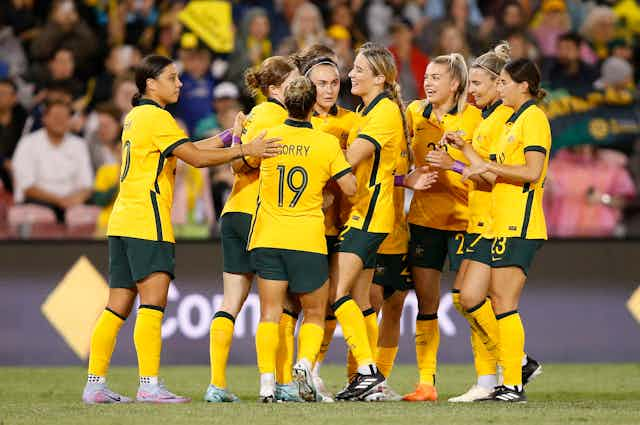In the lead up to the first FIFA Women’s World Cup hosted in the Southern Hemisphere, host nations Australia and Aotearoa New Zealand are forging other firsts, including efforts to break the shame, stigma and taboo that continue to shroud periods.
In April, both teams unveiled new kits that included period leak protections, together with materials and tailoring that specifically respond to the needs of high performance women footballers.
New Zealand has also swapped out its traditional white shorts for teal blue to help combat period anxiety.
Similar changes are occurring across the global sporting landscape, albeit more slowly in some quarters.
Despite initial reluctance, last year the All England Club relaxed the long-held tradition that Wimbledon players wear all white, so women can now wear dark undershorts.
In rugby, the Irish national women’s team have permanently switched white shorts for navy, while New Zealand referees are no longer required to wear white shorts.
The impact of these changes should not be underestimated. The shame and taboo associated with periods stops many young girls from continuing sport, and misinformation about menstruation affects the performance and health of countless elite athletes. The 2023 FIFA Women’s World Cup is an opportunity to dispel period myths and put a focus on the specific needs of athletes who menstruate.
Women athletes aren’t small men
Women’s elite sport continues to be professionalised, yet their training protocols have often been based on research evidence derived from male cohorts.
This research doesn’t consider the physical and psychological changes that women athletes may experience at each phase of the menstrual cycle, nor how that may affect peak performance.
Research into how the menstrual cycle affects the performance of women athletes is growing. Teams are employing methods to work with the period cycle, rather than against it.
Reigning FIFA Women’s World Cup champions the United States say that menstrual tracking is one of their performance weapons.
No longer a mark of honour
Ignoring and generalising the needs of women athletes not only hurts performance, but can damage health.
Overly intense training can cause some athletes to stop having periods. This has often been considered normal by coaches and a mark of honour among athletes themselves. Indeed there’s a dangerous notion in many high performance sporting cultures that the absence of menstruation equates to an ideal elite athlete.
But this can lead to serious health consequences, including a condition called RED-S – relative energy deficiency in sport. Symptoms include periods stopping or becoming irregular, reduced performance, mood changes, and recurrent illnesses and injuries including stress fractures.
Australian research involving 112 women elite and pre-elite athletes found almost 80% of participants demonstrated at least one symptom consistent with RED-S. Nearly 40% experienced at least two symptoms.
Like women in other workplaces, elite athletes are often reluctant to discuss the impact of their periods fearing assumptions they are a liability in team environments, less capable, and not deserving of development opportunities.
Change is happening, albeit slowly
Across some high performance pathways, road maps are being developed to specifically support women athletes. For example, the Australian Institute of Sport launched an initiative in late 2019 to “improve female athlete specific knowledge and systems of support”. And in March, the South Australian government started its “I’m an athlete. Period” campaign which aims to promote positive menstrual health in sport.
Many women athletes themselves have started to speak up about the taboo associated with menstruation and are lobbying for change.
Earlier this year, decorated Australian Olympic swimmer Cate Campbell shared the performance struggles she has experienced managing her periods.
While her training and nutrition regimens were monitored with precision, the absence of information and access to a network of women’s health professionals saw her suffer a near career-ending injury.
To try and manage her periods, she had a contraceptive bar inserted into her arm, which is meant to be inserted into the fat layer above the muscle. But because she’s an elite athlete, she has a very low body fat percentage, so the bar was inserted next to her muscle. A botched attempt to retrieve the bar caused her permanent nerve damage.
She’s now using her profile to raise awareness of women’s health issues and to try and reduce the taboo around periods.
Girls’ barriers to sport
Puberty, and the start of periods, is a time when girls’ participation in grassroots sport falls off sharply.
A UK survey of more than 4,000 teenagers published last year found there are complex barriers and deep-rooted negative attitudes affecting girls’ enjoyment of sport, including period shame and body image issues.
It found, of girls in the survey who used to be sporty, 78% said they avoided sport when they had their period, and 73% of this cohort said they didn’t like others watching them take part in physical activity.
Of girls who avoided exercise on their periods, 73% said it was due to pain and 62% did so out of fear of leakage.
Various state governments are investing in grassroots sport facilities that better attend to the needs of women. But many facilities continue to lack basic amenities including menstrual bins.
Read more: Celtic FC leads way in tackling period poverty, now other clubs need to follow
An important way to address these issues is for sporting clubs to develop “period positive” cultures.
Clubs should undertake measures such as:
providing comfortable and period-friendly uniforms
supplying sanitary bins and ample period products for free
and having open discussions about periods and how they may impact athletes.
These can help girls and women be empowered to manage their periods in ways that will enable them to continue their participation and not feel ashamed or embarrassed.
With the world cup media spotlight, we have an unprecedented opportunity to break menstrual shame, silence and taboo.

